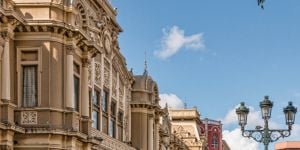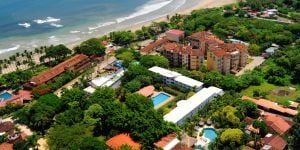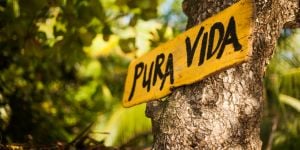Cost of Living in Costa Rica in 2020
Subscribe to the topic
Post new topic
Hi everyone,
Every year, we invite expats who are living in Costa Rica to share their experience and tell us more about the average price of products and services in their town, city or area, so that we can help future expats planning to settle in Costa Rica.
We would like to thank you in advance for your contribution.
Regarding accommodation, how much does it cost to rent or buy an apartment or a house in Costa Rica?
How much do you pay on average for public transport (bus, subway, train, tram, taxi)?
How much does it cost to fill up your cars fuel tank?
Concerning your food expenses : how much do you pay for basic food items such as rice, bread, and pasta? What is the average price of your monthly food shopping?
How much does it cost to have health insurance? How much for a health specialists consultation in Costa Rica?
How much does childcare cost on average per month? What about school fees?
How much do you pay for electricity, gas, water, internet, mobiles subscription etc., per month?
How much do you spend on leisure in Costa Rica (cinema,sport, etc)?
Feel free to add any other daily expenses that you have in mind.
Thank you for sharing,
Loïc
Regarding accommodation, how much does it cost to rent or buy an apartment or a house in Costa Rica?
Renting seems to vary between around $500 a month (small house or apartment) to way higher. I'd say the average 2br house in a mountain town like San Ramon is between $700-1000 a month. Not cheap! You'll generally pay more at the beach.
One tip is to contact expats to see if there's an empty house that someone would rather rent out than have empty and sometimes you can strike a good deal, maybe an even better deal if you're a handy man of any type and can do or manage any small repairs or make improvements they might want.
To buy, it totally depends on the location and how big the house etc. I know of a house for sale on 2 acres with ocean views for only $100k U.S. but generally speaking big gringo houses aren't cheap, especially with ocean views, especially in "gated communities" full of gringos. A 2br house on a SMALL lot you can probably get for around $175k-225k. I'd buy the small house on a big lot for $100k and add another bedroom!
To buy a house it is best to be here, feet on the ground and spend months looking for a good deal. That is true for renting a house, as well, if you can swing it.
How much do you pay on average for public transport (bus, subway, train, tram, taxi)?
A bus to San Jose from San Ramon - about a 1hr 15 to 1hr 30min ride, is between $2-3 one way. Very cheap. Get the Direct bus when you can, it's faster.
A 20 min taxi ride costs me $12.50 one way. Local taxis that take you a couple miles across town may be $2-3.
How much does it cost to fill up your car’s fuel tank?
Gas cost is $4.30 a gallon as of 02-29-20. I've seen it higher in previous years.
Concerning your food expenses : how much do you pay for basic food items such as rice, bread, and pasta? What is the average price of your monthly food shopping?
Food depends on what you eat. I don't eat meat so that makes my bill cheaper. Milk and cheese are about the same cost as in the USA. Bread is about the same unless you buy whole wheat bread then it will cost a bit more than in the USA.
Most food is about the same overall as in the USA. Vegetables can be cheaper depending on where you buy here and where you buy in the USA. Not a huge difference. Organic often costs more here than in the USA. Sometimes its cheaper. I get organic tomatoes cheaper here than in the US. BUT some organic food is not available here or hard to find in any case.
How much does it cost to have health insurance? How much for a health specialist’s consultation in Costa Rica?
Health insurance costs about $80-90 a month for a married couple here. However depending on where you live the CAJA/ EBAIS system is not that great. For example I have to get up at 5am to go stand in line for a doctor appointment so it can take half a day or more to see a doctor - something not fun when you feel bad!
So you can get a Redbridge or Coopeane discount doctor/lab plan for about $12 a month which gives you $14 doctor visits (6 incidents per year) and $30 specialist visits (you have to see a general doctor first tho to get the referral just like HMO's in the USA). Basically you pay 40% of the regular cost of doctors and labs. Prescriptions you can then get via the CAJA/EBAIS for most things (not all) for free. I suppose you could get the lab tests via EBAIS as well but that's going to be another situation of a long line probably. Not sure.
I use the private Discount Plan system for everything as I seldom go to a doctor.
How much does childcare cost on average per month? What about school fees?
No idea.
How much do you pay for electricity, gas, water, internet, mobile’s subscription etc., per month?
My electricity runs about $30 a month on average. Used to be cheaper but I now use electric water heater and run 2 fans most of the time and on cold nights I run a heater for a few minutes while I shower. I also cook mostly with a toaster oven. Before I used these appliances it was only about $12 a month.
I use prepaid internet for $32 a month.
I pay about $11 every 3 months for propane. I don't cook a lot.
Water runs about $7 a month in the rainy season and about $22 a month in the dry season because I water parts of my property.
How much do you spend on leisure in Costa Rica (cinema,sport, etc)?
I seldom go out for leisure activities. My leisure is watching cable and tv series and movies, and occasionally carrying out a pizza or Chinese food. Pizza is $13 for the largest vegetarian one. Chinese is about $5 for vegetarian. Sometimes I get middle eastern food which is about $12.
Having no rent (I own my home) I live on less than $1200 a month.
Cost of Buying, Owning and Driving A Car:
One thing you didn't mention is cost of having a car. It's expensive even if you hardly drive!
There is auto insurance (full coverage about $55 a month), then there is gas at $4.30-5.30 a gallon. If you live out in the country you'll need brakes and tires more than you would in most places in the USA.
Once a year you will pay Marchamo (registration and MORE (National) insurance you can't opt out of) and RTV which is a super intense checking of your car where they check almost everything: suspension, steering, brakes, emissions, tires, etc and hope to fail you it seems to most of us, so you have to bring it back through again. (I've been failed on brakes even after having them just fixed and they were Great!)
So RTV itself costs (I forget now) maybe $18. But the smart thing to do if you have an OLD car is to take it to a mechanic first and have them check it for passing the tests. My old car which I drive on a bumpy road seems to always need about $200-400 in repairs each year to pass RTV. I just paid $200 the other day to prepare mine. Had to have a new catalytic converter, silencer and brakes.
Overall cost of living here depends on how you live. If you move into a poorly insulated house at the beach your a.c. - which you more or less need there - can cost up to $100 or more a month. If you build there you need to pay extra for extra good insulation.
If you live in a gated community you'll probably have to pay various monthly fees.
If you have a pool they're pretty expensive to maintain.
If you buy imported food that's expensive.
If you go out to eat a lot, that can be expensive.
Going to some bars is pretty expensive. (I have seen $5 for french fries and was shocked. I didn't even pay that in the USA!)
Anything imported from the USA or Europe is expensive - like 50-150% more.
Packaged food and health food is expensive if imported.
All in al, the cost of living in Costa Rica is ABOUT the same cost as in the USA but can be cheaper than the USA if you eat local food, and more or less live like most Ticos.
If you want to live in luxury with a huge house and pool and gated community and all that... you'd better have a nice sized income. I've seen people say they need $2000 a month to live here with their normal lifestyle. I live on a little more than half that.
BUYING A HOUSE OR BUILDING ONE:
By the way, let me bust 2 Myths about living here (some may disagree but this is my experience!)
1) In my opinion having lived here for over 4 years, living in a gated community is NOT safer than living out in the country by yourself. It's not generally an unsafe country but burglaries do happen and mostly I've seen them in gated communities.
2) Building a house is not that difficult IF YOU LIVE HERE while it's being built and if you don't buy in a big "development". Buying in a development where they build your home is the riskiest thing to do (though yes there are good ones but... be careful!). We built our own home, it was done on time, done well, and we were very happy with it. Doing it on your own means you have input into the quality of the things like sinks, floors, fixtures, insulation, roofing, etc etc and that means you will be sure it's made with quality materials and fixtures, correct drainpipes and so on.
If you buy a house make sure the drainage, plumbing, insulation, electricity etc are built to American (or other Quality) standards. One of the other.
But I keep seeing people afraid to build here. My wife and I knew nothing of how to build a house but hired people who did and we were on site every day to make sure they were a) working hard; and b) doing things that appeared to be done well, and c) were following the plan correctly. It isn't rocket science, we learned and you can too. And our home was finished exactly on time and with very little overage cost. We're very happy with our owner-built house.
Remember that if you buy in a development where they are building your house, they may be looking to cut costs by cutting corners with lower quality materials etc. Certainly not all developer/builders are cutting costs etc BUT it's something to watch out for.
My advice : buy land on your own, build your own home. That way you can choose the faucets, toilets, flooring, insulation, sinks, cabinets etc that YOU want!
I can honestly say if I had it to do over again, that's what I'd do again.
Thank you very much for that impressively detailed report samramon !



i concur we bought land 15 yrs ago and are just building right now. it is way cheaper than buying in a gated subdivision. and as you said you have the options of bringing upgrades into the house. design choices too. we are doing solar hot water, solar pool pump, inverted AC units all to lower the overhead. Also adding rough in for solar panels should we go that way in the future. it is a process for sure with getting the right architect and builder. a good contract with the builder too through a lawyer to spell out payment structure and liabilities. doing the homework on type of construction, materials and such. one example is the new polysand roofing tiles. 50yr warranty. all in all you have to be involved to get the great results you would expect. thanks
I'm new to this forum.
Recently purchased land in CR. Very excited. I agree with purchasing land outside a gated community. My brother and I have architecture background and have already gone through the process of interviewing builders from referrals and have found a suitable candidate. We also have several acquaintances already living there, each with their own personal story and experiences from which we can draw in order to avoid costly mistakes. Construction knowledge is key and if you don't have much of it, make sure to partner up with someone you trust with quality work behind them.
We are absorbing new information everyday about tropical construction using energy efficient items like inverter A/C, etc...as yaki del sur mentioned.
I am looking forward to feedback from those of you who have been living there for a while already and sharing the wealth of information you have on certain subjects as encountered.
Cheers
Put 2-3 times the amount of screws in the roof than "normal".
We had our first hurricane ever here a couple years ago and with global climate change, who knows when the next one might be? And screws are cheap! use the long ones with little rubber/metal washers as part of them.
Yes, just because some people had issues with builders, now many sites have scared people out of building their own homes. If you ask around and look around - look at samples of what the builders have built, maybe take someone with you who knows about home construction - you can find a good builder.
Write a contract that says "must be well built" and define what "well built" mean:
level floors (or angled slightly towards an outside door?) and straight ceramic laying... smooth and consistent plastering, no leaks in the roof, windows placed and SEALED tight, adequate drainage tubes for water and toilet, adequate septic tank and drainage /leech field... etc etc.. AC outlets and switches placed in the plan where you want them, LED lights and where, ceiling fans and where, what kind of insulation (insulation is super important! both for noise and cool air retention!... etc.
Put thick black plastic under the cement foundation to reduce moisture from coming up through the ground! Put it in the contract! Figure out the size septic tank and specify the quality and material you want.
When will the house be finished (barring natural disasters) and specify penalties. Put a limit on overages. Be reasonable though! or you won't find a builder to sign it! LOL. Work with them on the contract and compromise.
Talk to people who've built here and ask about things they wish they'd have done better.
Spell it out in a lawyer made contract.
Building your own home does not have to be difficult at all if you do some homework and hire the right people! Ours was an easy happy experience!
Thank you very much for your input samramon.
Although my brother and I have extensive architecture + construction experience, it is first hand experience, input + accounts such as this that we are looking for. We have spent countless hours researching and communicating back and forth with the builder/engineer to discuss the many facets of the project. Ultimately there is no way to foresee every little detail hence why I joined this forum. To learn from your experiences, make sure to cover as many bases 
Articles to help you in your expat project in Costa Rica
 Work in Costa Rica
Work in Costa RicaA low unemployment rate and a strong economy set Costa Rica apart from its neighbours. If you have fallen in love ...
 The health care system in Costa Rica
The health care system in Costa RicaCosta Rica has received international praise for its modern healthcare system, and both citizens and legal ...
 Key facts for international students in Costa Rica
Key facts for international students in Costa RicaCosta Rica is an attractive and affordable country in which to study, with one of the highest literacy rates in ...
 Setting up a business in Costa Rica
Setting up a business in Costa RicaThe government's positive attitude towards foreign investment, as well as the country's developed ...
 Motorcycle Angel
Motorcycle AngelMotorcycle Angel
 Buying a property in Costa Rica
Buying a property in Costa RicaCosta Rica's political and economic stability, as well as its natural beauty and pleasant climate, make it an ...
 Retiring in Costa Rica
Retiring in Costa RicaMany retirees are attracted by Costa Rica's stable democracy, excellent healthcare, enjoyable climate, natural ...
 How To Become A Resident In Costa Rica
How To Become A Resident In Costa RicaResidency In Costa Rica - Types of Residency
Find more topics on the Costa Rica forum



